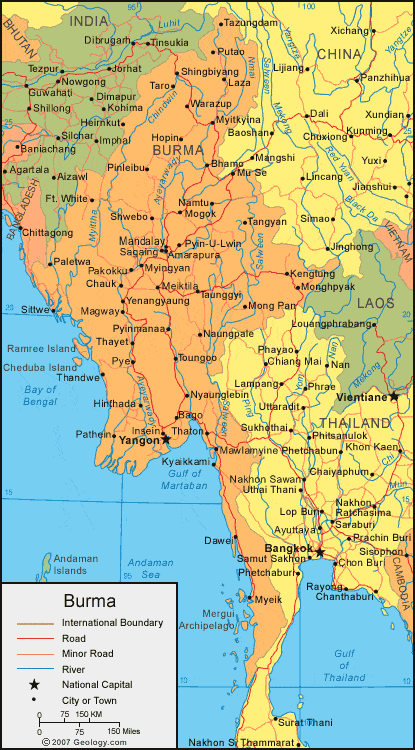From the Washington Post:
"Burma's AgonyBy Rena Pederson
Thursday, February 19, 2009; A15
NAYPYIDAW, Burma -- This is a city constructed out of fear. Naypyidaw reportedly was created by Burma's brutal dictators on the advice of astrologers and built in part by forced labor. Worried they might be vulnerable to attack in Rangoon, a port city, they abruptly moved the government 250 miles to the north three years ago and modestly named the new capital "Abode of Kings."
It is from here that the generals ordered that monks peacefully protesting gas prices in 2007 be beaten, shot and imprisoned, and here that they hunkered down in their mansions and thwarted international efforts to help after Cyclone Nargis devastated the Irrawaddy Delta last year and ravaged the lives of millions.
Few reach this remote city: Permission is required to come by plane, and a new superhighway was built primarily for government officials. Most travel the six-plus hours from Rangoon over a bumpy two-lane road shared by plodding ox carts and bicycle riders. Much of rural Burma still functions without electricity; families get by as they have for centuries, with hand pumps for water and cooking fires. Only the tea shops in villages have TVs, which run on generators. People watch soccer and maybe the news on al-Jazeera, then walk home in the dark.
Near Naypyidaw, however, the skies come ablaze. A huge new power station makes electricity available for the generals at all hours. The rutted road turns into an eight-lane highway lined by lights. Nearby, a reproduction of Burma's most hallowed site, the Shwedagon Pagoda in Rangoon, is being constructed as the generals race to show their piety.
At first glance, the capital looks almost normal. There's a new mall sporting cheap Chinese goods, a zoo where children can feed elephants, modern high-rise apartments, a luxury resort with a golf course. But there are also guards everywhere -- in towers, on corners. And people along the side of the road seem to be watching everyone else -- intensely.
In recent weeks, reports surfaced that the junta is building a series of tunnels under the capital. Rumors swirled: Are they part of a nuclear project? Escape routes? An underground gulag?
On one level there is a plastic veneer of modern life. Local TV channels show smiling young models singing about "Kiss Me" shampoo, and billboards advertise laptops. There's even a Starbucks-style coffee house in Rangoon.
Yet on another level there is rampant poverty, disease and sex trafficking. People in famine-stricken areas pay a nickel for rats to eat. In the northern no-man's land, miners are paid with opium and pass along HIV via group needles. In the largely Christian Karen villages that the junta is systematically destroying, the women are raped and children are forced into the military as human mine detectors.
In the Mandalay area farther north, the monasteries where the monks' Saffron Revolution began in 2007 are still under heavy guard. The worship places are silent, abandoned. South in the delta area battered by Nargis, people struggle to get by -- haunted, they say, by the ghostly cries of those who were swept away. Though the government has trumpeted its help, most of the assistance has come from nongovernmental organizations, churches and monasteries.
Here in Naypyidaw, ruling general Than Shwe recently claimed he was so busy accepting the credentials of some new ambassadors that he did not have time to meet with U.N. special envoy Ibrahim Gambari about democratic reforms. Gambari left after being rebuked by Prime Minister Gen. Thein Sein, who demanded the lifting of international economic sanctions on Burma and called them a "human rights violation." U.N. Secretary General Ban Ki-moon put a diplomatic spin on events, saying Gambari had "good discussions there even though one may not be totally satisfied."
Gambari is supposed to brief the Security Council on Friday. Members should be told what the generals did as soon as he left: closed more churches in Rangoon, refused to let lawyers visit some of the country's more than 2,100 political prisoners and extended the arrest of an 82-year-old opposition leader.
Naypyidaw symbolizes the stalemate over Burma: The generals in their labyrinth have created a surreal reality and defy world opinion. The international community lets them get away with it by failing to produce an effective, moral, organized response.
It is up to the Obama foreign policy team to put more backbone in the U.N. efforts. Secretary of State Hillary Clinton's remarks yesterday about sanctions drew new attention to the issue. The Obama team has the chance to calibrate financial sanctions so they squeeze the generals and their money-laundering cronies. It can insist that verifiable benchmarks of real progress, such as the release of political prisoners, be met before development favors are done for the junta. And it can remind the world that the election scheduled for 2010 shouldn't fool anyone. It is being engineered to ensure the generals' hold on power, meaning business will continue as usual in Naypyidaw.
Rena Pederson, a former speechwriter at the State Department, is the author of the forthcoming book "The Burma Quartet."
Me:







































